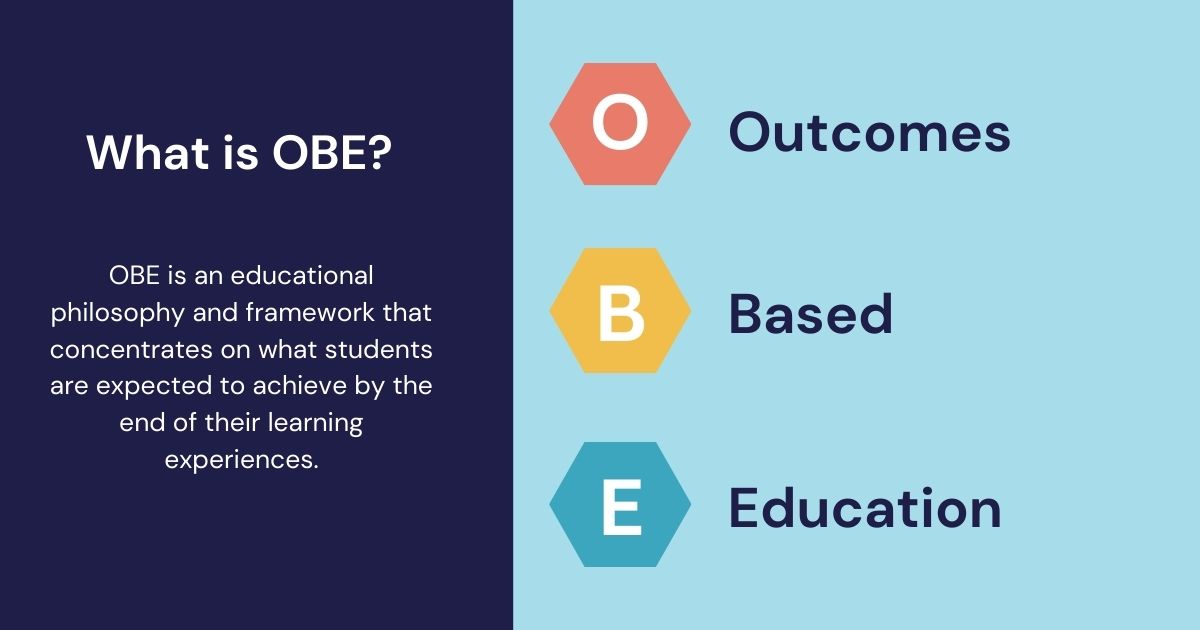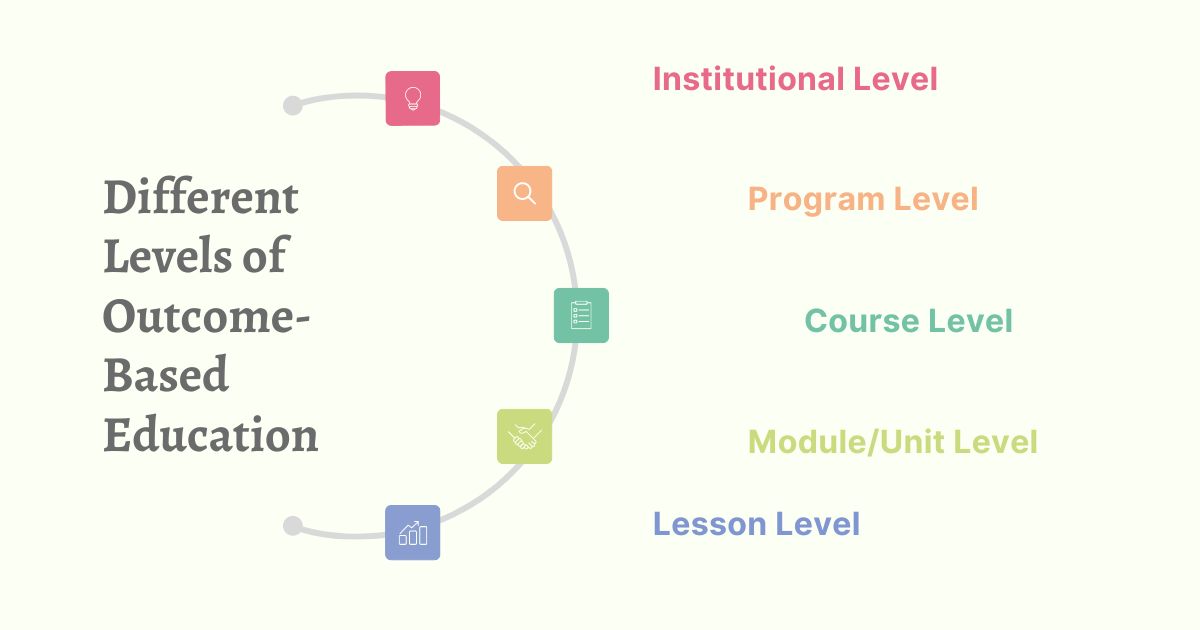What is Outcome-Based Education? Examples & Different Levels
Outcome-Based Education (OBE) is a progressive approach to learning that shifts the focus from what teachers teach to what students learn. In essence, it's purposeful, relevant, and measurable education.
This article will delve into What is Outcome-Based Education? The core features of OBE, explore its significance in modern education, its different levels, and provide an example of its implementation.
What is Outcomes-Based Education?

Outcomes-Based Education (OBE) is an educational philosophy and framework that concentrates on what students are expected to achieve by the end of their learning experiences. Unlike traditional education models that often emphasize the process of teaching courses, OBE is centered around clearly defined learning outcomes—what students should know, be able to do, and value upon completion of a course or program.
Overall, OBE presents a valuable approach to education by prioritizing student learning outcomes, but it still points out a clear connection between teaching and learning. However, it's important to acknowledge the potential challenges of maintaining a balance between standardized outcomes and fostering a love for learning.
Key Features of Outcomes-Based Education
Outcomes-Based Education (OBE) is characterized by several key features that distinguish it from traditional education models.
Clear Learning Outcomes

OBE revolves around the establishment of explicit and measurable learning outcomes. These outcomes define what students should know, be able to do, and value by the end of a course, program, or educational level. Learning outcomes point out clear targets for both teaching and assessment, guiding the entire educational process.
Student-Centered Learning
In OBE, the focus is on the needs and abilities of the students. Instruction is designed to help students achieve the defined outcomes, and teaching methods are tailored to accommodate diverse learning styles. This approach prioritizes active learning resulting in encouraging students to take responsibility for their own learning.
Assessment and Evaluation Based on Outcomes
Assessment measures whether students have achieved the specified outcomes, rather than simply assessing their performance through traditional exams or assignments. Assessments are designed to show meaningful feedback on students' progress toward meeting the outcomes.
Continuous Improvement
OBE still has the characteristics of an advanced education. The outstanding feature is the continuous improvement by regularly reviewing and adjusting the curriculum, instructional methods, and assessments based on student performance combined with feedback. This iterative process aims to enhance the effectiveness of the educational experience so that learning outcomes are being met effectively.
Focus on Competency Development
OBE emphasizes the development of competencies and skills that are relevant to real-world applications. The learning outcomes often include not only knowledge but also practical skills, problem-solving abilities, and attitudes that are valuable in every context.
Emphasis on Learning rather than Teaching
In OBE, the focus shifts from the process of teaching to the outcomes of learning. The primary goal is for students to achieve the specified learning outcomes rather than simply complete a set of instructional activities. This shift in focus encourages educators to adopt teaching methods that are most effective in achieving the desired outcomes.
Outcomes-Based Education offers a structured, student-centered approach to learning, with a clear specific goal of achieving specific educational goals and continuously improving the educational experience.
Importance of Outcome-Based Education

Outcomes-Based Education (OBE) emphasizes achieving specific, measurable outcomes or learning goals. Here are several reasons why OBE is important:
Clarity and Focus on Learning Goals
With clearly defined outcomes, teachers can design their curriculum and instruction around these targets, so all activities are aligned with achieving the desired results. This focused approach prevents ambiguity in teaching and learning, making the educational experience more directed.
Measurable and Meaningful Assessment
OBE's assessments are directly tied to the learning outcomes, making them more meaningful and relevant. Rather than relying solely on traditional exams or grades, OBE utilizes a variety of assessment methods, such as projects, portfolios, and performance tasks, to evaluate whether students have achieved the specified outcomes. This approach draws a more comprehensive picture of student learning and opens up a comprehensive view for educators to identify areas where students may need additional support or intervention.
Improved Accountability and Transparency
OBE promotes accountability and transparency in the educational process by clearly defining what students are expected to achieve and how their success will be measured. Educators are accountable for delivering instruction that supports students in meeting the outcomes, while students are accountable for demonstrating their learning progress. This transparency builds trust with stakeholders, including parents, employers, and policymakers, who can see the tangible results of the educational process.
Preparation for Real-World Challenges
One of the primary goals of OBE is to prepare students for real-world challenges, equipping them with the knowledge, skills, and attitudes necessary for success in their lives. The learning outcomes in OBE meet the demands of the modern workforce in society, emphasizing practical skills, critical thinking, collaboration, and adaptability.
Different Levels of Outcome-Based Education

OBE can be structured at various levels, each with distinct characteristics and objectives.
Institutional Level
At the institutional level, broad goals are set that align with the institution's mission and vision. All programs contribute to overarching institutional outcomes. Graduate attributes are the qualities, skills, and understandings that a university aims to develop in its graduates.
Program Level
Program Educational Objectives (PEOs) describe the professional accomplishments the program prepares graduates to achieve within a few years of graduation. Program Learning Outcomes (PLOs) are specific skills, knowledge, and behaviors that students should be able to demonstrate by the end of the program. PLOs are aligned with the PEOs, embracing competencies in communication, critical thinking, and technical skills.
Course Level
Course objectives guide the selection of content, teaching methods, and assessment techniques. Course Learning Outcomes (CLOs) are specific abilities or competencies that students are expected to demonstrate by the end of the course.
Module/Unit Level
Module objectives are specific goals for individual modules or units within a course, detailing what students should learn in a particular segment of the course. These outcomes are more granular than CLOs and focus on smaller segments of learning, submitting detailed guidance for both teaching and assessment.
Lesson Level
Lesson level equips the knowledge or skills students should acquire during that lesson. They structure individual classes in particular, assessing short-term learning, thence each lesson contributes to the broader goals of the course in general.
Outcome-Based Education Example

To better understand Outcomes-Based Education (OBE), it is helpful to explore specific examples that illustrate how this approach is implemented in educational contexts.
Example: Primary School Mathematics
Subject: Mathematics
Grade Level: 3rd Grade
Learning Outcome: By the end of the course, students should be able to solve simple addition and subtraction problems involving numbers up to 100.
Implementation
Curriculum Design:
The curriculum includes topics such as basic addition and subtraction, number sense, and problem-solving strategies.
Interactive activities combined with visual aids are used to assist students in understanding mathematical concepts.
Instructional Methods:
Teachers use hands-on activities like counting objects, using number lines, and playing educational math games to engage students.
Collaborative group work encourages students to solve problems together and explain their thought processes.
Assessment
Formative assessments comprise quizzes, oral presentations, and class participation to gauge students' understanding throughout the course.
Summative assessments are written tests with practical problem-solving tasks, requiring students to demonstrate their ability to perform calculations and explain their reasoning.
Feedback and Support
Teachers provide individualized feedback and additional support for students who struggle with specific concepts.
Supplementary materials, such as math workbooks or online resources, are provided for students needing extra practice.
Outcome Evaluation
Success is measured by students' ability to correctly solve addition and subtraction problems, as demonstrated in assessments.
Students who achieve the learning outcome can demonstrate understanding by explaining the steps involved in solving math problems.
Get ready to enhance your expertise in Outcomes-Based Education (OBE) with our comprehensive and engaging courses. Please click on the course name below to learn more:
Artificial Intelligence (AI) in Education
This course is designed for educators who are interested in understanding the basics of Artificial Intelligence (AI) in Education. The course will provide an overview of AI in education and help you gain an understanding of AI technologies in the educational setting. You will learn about the current usage of AI in classrooms and identify the ethical considerations of AI in Education. Additionally, you will acquire the essential knowledge and skills for incorporating AI in the classroom today and prepare for the future advancements of AI in Education.
Creating Online Course with AI
This is a comprehensive guide for starting your first E-learning and info product business. This course will be concentrating on two main aspects, the first will be focusing on creating content for your online course where you will be guided step by step on how to automatically generate contents for your online course using AI tools, meanwhile, the other one will be focusing on the business perspective where you will learn how to market your online course and know how to set the right price for your online course.
Applications of Chatgpt Masterclass for Teachers and Edu
In this class you will learn how to use Canva, how Chatgpt work, how to teach students to use Chatgpt responsible, about Ai detection, how to use ai image generation in lesson, and so much more.
Conclusion
Outcomes-Based Education (OBE) represents a significant shift in educational philosophy, placing a strong emphasis on the specific skills, knowledge, and competencies students need to succeed. As education continues towards light, OBE stands out as a forward-thinking model that prioritizes student achievement with practical application. A method bridging the gap between education and the demands of the workforce.
OBE is a promising pathway toward achieving excellence in learning. To learn more about this educational philosophy, you can sign up for Skilltrans courses. We have useful courses at the most preferential prices waiting for you.

Meet Hoang Duyen, an experienced SEO Specialist with a proven track record in driving organic growth and boosting online visibility. She has honed her skills in keyword research, on-page optimization, and technical SEO. Her expertise lies in crafting data-driven strategies that not only improve search engine rankings but also deliver tangible results for businesses.



